- Home
- Julia London
A Courtesan's Scandal Page 3
A Courtesan's Scandal Read online
Page 3
Mamma might have lacked imagination, but she’d meant well. She’d named Kate’s brother Jude, for a Catholic priest who had given her alms when Father had lost yet another position.
“That may very well be, but you are not of them, Katharine. Not any longer,” Digby said sternly. “Your kindness toward those who have sought to use you ill since you were a girl is nothing short of insanity.”
Kate smiled at Digby. He believed every single person in and around the St. Katharine quays had tried to exploit her when she’d been cast out of her home at the tender age of fourteen. Or was it thirteen? Kate could no longer remember precisely. “Digby—I met you down at the docks.”
He sniffed at that, and cast his gaze out the window.
The area of St. Katharine’s might be a bit unsavory, but it was nonetheless home for Kate. Growing up, she and Jude had lived among people who worked quayside or in the cramped warehouses. They’d never had enough to eat, but in Kate’s memory, her mother had been charmingly unruffled by it. She could make a single potato feed four.
Unfortunately, Kate’s mother contracted consumption when Kate was ten or so—she was gone by the time Kate was twelve. Nevertheless, Kate remembered her with much love. She’d had blonde hair like Kate, and vivid green eyes. She would lie on a pallet before the hearth with Kate and Jude and they would dream of a better world. “We won’t always be like this,” her mother would promise them. “Not when the faeries come, we won’t.”
“Tell us about the faeries, Mummy,” Kate had asked, never tiring of hearing about them.
“One night, they will come for us, and they will wrap us in their wings and whisk us off to a cottage in the forest.”
“What’s a forest?” Jude had asked.
“Oh, you’ve never seen anything quite so beautiful,” her mother said. “There are trees and birds—not the sort of dirty birds you see on the quays, but pretty birds, blue and green and red. And there are flowers that grow wild there, and tiny little rivers and sunshine, always sunshine …”
The dream of being whisked away had ended when Kate’s mother died. Kate’s troubles started when her father remarried. His new wife, Nellie Hopkins, had two children of her own and didn’t care for the responsibility of feeding two children she hadn’t birthed.
“I’d not mind the place so much if your efforts were properly appreciated,” Digby said, drawing Kate’s attention once more as he eyed the basket she carried.
“They are appreciated,” Kate said. “Would you like a muffin?”
“No,” he said, folding his hands over his large belly. “I have in mind a pie and mash from Mrs. Anderson’s shop.”
Kate couldn’t help but laugh—for all of Digby’s indignation on her behalf, he’d found something he liked in the shops and market stalls along Butcher’s Row and Mary Street.
When they arrived at St. Katharine’s, Kate was not the least surprised to see that the daily activity had not slowed because of a little dusting of snow or a religious holiday. The street was teeming; the denizens of the docklands did not consider Christmas a holiday. When survival was a day-to-day proposition, luxuries such as Christmas feasts and merrymaking were frivolous extravagances.
Kate and Digby departed the carriage on Butcher’s Row, a long, narrow strip of cobbled lane crowded by low buildings and shop fronts. With the basket in one hand, and a firm grip of Kate’s elbow in the other, Digby propelled her into a diverse throng.
If there was one thing Kate had appreciated growing up quayside, it was the different people here. There was always something new to see—people with skin as black as coal wearing brightly striped pants and black coats; Indians with turbans on their heads; Spanish sailors, whose tankards of ale sloshed over their worn peacoats. There were ladybirds sitting in their windows wrapped in wool, calling down to the men who carried cargo on their shoulders and sailors who had fallen into their cups. There were travelers newly arrived to London, wandering down the street with their portmanteaus, looking around in awe. There were shopkeepers and match girls and lads who’d been trained to pick pockets darting through the crowds.
In the storefronts, meats hung from underside of the eaves. One could only guess how fresh it might be. At least today there was no sound of braying cattle in the alleys behind the storefronts, where the butchers did their work—Kate supposed the poor beasts had been given a Christmas reprieve. As it was winter and quite cold, the smell of rotting meat and cattle dung did not permeate the air quite as heavily as it did in summer. The most notable smells this morning were those of smoke and fish.
“Eh, love, come ’ere, then,” a man called out to her.
“Have a care, sir!” Digby rumbled, moving protectively in front of Kate. “Jug-bitten free-traders, the lot of them,” he muttered irritably.
Kate adjusted the hood she wore over her head, pulling it lower. She’d always drawn attention, and not always the sort she wanted—one of her earliest memories was of a leering shoemaker fondling her feet under the pretense of measuring them.
Kate understood she was considered a beauty by most—after all, it was her looks that had lifted her out of this wretched place. Yet while Kate could see that she was comely enough, she did not think herself more comely than many other women. When she looked in the mirror, she saw a nose that was not quite straight and green eyes set too far apart. Her hair was an unusually pale blonde, but she did not understand why that should appeal so greatly to men … with the glaring exception of the Duke of Darlington, obviously, who had looked at her with such judgmental disdain that she had scarcely managed to keep a civil tongue.
Darlington reminded Kate of the difference between men of the ton and the men of St. Katharine’s. Lords and gentlemen who fancied themselves a cut above the rest because of their education and breeding were so very quick to judge her, yet many of them still desired to use her. The men on Butcher Street made no judgments about the choices Kate had made in her life—they just wanted to use her.
Digby guided her onto Mary Street, where cloth and wool houses rose up on either side of the street, blocking the day’s light. Kate and Digby hurried past the warehouse where Kate had found work after Nellie Hopkins had determined that there wasn’t enough money to feed all four children, and that either Kate or Jude must go. Jude was only ten or eleven years old—so Kate had gone, and her father had not stopped her. Then again, he’d been too foxed to stop her; he’d spent most days drunk as a wheelbarrow.
“One cannot breathe even a bit of air that is not foul,” Digby groused. “I will never understand how you lived in these streets. Thank the good Lord you’ve escaped them.”
Perhaps she’d escaped, but Kate never felt very far removed from these streets. Her situation was precarious—one false move, one slight to the wrong man, and she could lose her position and end up on these streets again. She was preparing herself the best she knew how in the event that should happen. She’d put away as much of her pin money as she could through the years, and was teaching herself how to bake under the tutelage of her daily cook, Cecelia. If the prince tired of her, or the next man after that, or the one after that, Kate planned to establish a bakery. Perhaps not in this particular part of London, but someplace where she might live quite at ease and without worry and certainly without … without being kept. She had to watch her figure now, but when she had her bakery, she would eat as many treats as she liked. She would be fat and happy and blissfully unencumbered of men. Kate despised being kept … but it was a far sight better than the alternative.
They reached a passage between the streets that was not worthy of a name; there Digby paused and looked sternly at Kate. “One half hour, madam. You are not to quit the building until I have come to fetch you. Am I perfectly clear?”
“Perfectly,” she said cheerily. She took the basket from Digby, gave him a little wave of her gloved fingers, and set off down the passageway to a door with peeling paint. She knocked; a moment later, the door swung open and a woman dressed in a ch
emise and a corset, her red hair down around her shoulders, stood behind it.
“Miss Bergeron!” the woman cried, and threw her arms around Kate at the same moment she drew her inside a pair of rooms.
“Happy Christmas, Holly!” Kate said.
Four of the five women who resided in this dreadful pair of rooms were lounging on dingy mattresses. Kate rented the rooms for them. They worked in the warehouses, earning a paltry wage for backbreaking work. These rooms kept them from living on the streets, or worse. Kate had a fantasy that one day, when she had unlimited funds, she would find a lovely house for them all. They deserved lovely houses—none of them had ever lived in much better than this.
The pair of rooms had once been a windowless office or storerooms of some sort. They were perhaps ten feet by ten feet each. In addition to the mattresses, the women had a pair of buckets, one for washing and one for waste, and a small brazier for cooking and heat. On one wall, they had attached several hooks, on which they hung their work dresses. Digby had supplied the work dresses—he maintained his contacts in the cloth warehouses and had bought the fabrics for pennies on the pound.
The rooms were quite warm in spite of the cold. “Look here,” Holly Bivens said, pointing to the brazier. “The factory give us coal for Christmas.”
“Lovely!” Kate exclaimed. She removed her cloak and draped it across the back of one of two chairs. Her gown was a plain, dull blue, her hair wrapped tightly at her nape. She wore no cosmetics.
“Wha’ ye got there?” Lucy Raney asked, propping herself up on her elbow as she eyed Kate’s basket.
“Glad Christmas tidings,” Kate said, and opened the top of the basket, tipping it down a bit so they could see the muffins and sweetmeats she had packed inside. The women all cried out with delight, and Kate handed the basket to Holly, who began to pass the sweetmeats around.
“Very kind of ye to come with it,” Esmeralda proclaimed. She was perhaps the oldest of the five women. “I’ll never understand what makes a fancy lady like ye come round here and treat the likes of us so kindly.”
“I’m not a fancy lady,” Kate said.
“Ye are indeed!” Lucy said. “Ye talk like the queen, ye do.”
Kate spoke like the queen only because Digby had taught her to speak and read the Queen’s English eight years ago, when he’d taken her under his wing. He’d been instructed to do so by Benoit Cousineau, a wealthy French cloth merchant. Benoit had happened to see Kate working in the warehouse, and as Digby related it, the Frenchman had instantly fallen in love with her. He wanted Kate, but he would not lower himself to bed a warehouse girl. Therefore, he had charged Digby with the task of making her presentable to a man such as himself.
Kate had wanted only a fair wage for her labor— not Benoit’s attention. She hadn’t wanted any man’s attention. She hadn’t liked men, not since another gentleman—a ship’s captain, to be precise—had likewise wanted Kate as his own. When she’d refused, he had taken his pleasure from her by force, and left her bleeding and bruised in an alley.
Kate wasn’t sure how old she’d been, but she didn’t think she’d been more than sixteen.
A year or so later, when Digby approached her on behalf of Benoit, Kate flatly refused him. But, as Digby kindly explained to her, if she did not do as Benoit asked, Benoit would have the warehouse foreman remove her from his sight. “Frenchmen are unusually proud, love,” he’d said to her. “He’ll not bring his cloth to this warehouse and risk seeing the lowly guttersnipe who refused him.”
Young and already weary of such matters, Kate understood that Mr. Digby was telling her she would lose her employment—a position she had fought hard to obtain— if she did not become Benoit’s mistress.
Still, Kate resisted.
Fannie Breen had convinced her to do it.
Kate let a room from Fannie, a palm reader who lived in a four-room house. She hired out girls to sailors, and might have done the same with Kate, but she had pitied her because of her experience with the sea captain. She allowed Kate to let a room that was no bigger than a closet, but told Kate on several occasions, “you could make me a rich woman, lass, you could indeed.”
Nevertheless, Fannie had a soft spot in her heart, and Kate often confided in her. Fannie liked to read Kate’s palms, too. “You’ll be rich one day,” she’d said. “A handsome stranger will fall in love with you.” Whether or not palms truly could be read, Kate didn’t know, but she liked the things Fannie told her. They fit her mother’s dreams of faeries spiriting her away to a warm cottage with a full larder and a milk cow and two pigs. Kate used to delight in imagining a handsome gentleman and two pigs!
But Fannie’s vision of her future crumbled at once when Kate told her of Benoit’s demand.
Fannie had snorted at Kate’s hesitance. “Are ye daft, then? If ye remain here, ye’ll die in the streets at the hand of a man or bearing his brat. And such a pretty thing ye are! If I were a ruthless woman, I’d have ye working for me, aye? Go on then, go to the Frenchman and take whatever he might give ye! Ye’ve no choice, stupid girl! If not the Frenchman, it will be another gent—at least let him be rich!”
So on a cold winter morning, Kate left with Digby to prepare for her role as mistress. Benoit Cousineau was three and forty. She was seventeen or eighteen.
A few months ago, Kate had tried to find Fannie Breen, but the woman had disappeared into the streets of St. Katharine’s.
Just as these women would disappear if Kate didn’t help them.
“Me mum is coming round today,” said Adele North, the youngest of the five women. “She’s to bring what’s left of the Christmas goose from the lord’s kitchens.”
“What’s left!” Holly complained. “What’s that then, the bones?”
“Oh no, indeed,” Adele said proudly. “The fancy ladies, they eat like sparrows.”
Holly and Lucy laughed at that.
“Where’s Meg?” Kate asked, looking around.
Esmeralda snorted. “As foxed as a fish in brine when I last seen her, hanging onto a rake.”
Kate worried about Meg. She was pretty and young and liked her ale a wee bit too much. She was always dangling after one gent or another.
“Not to fret,” Esmeralda said. “She’ll crawl back here when she finds herself on the rocks and finds her pockets empty, eh? What’s that I smell, apple?”
“Apple and peach,” Kate said proudly.
“Peach!” Lucy cried. “I adore peaches! How’d ye find peaches this time of year? Lucky is the day ye found Holly, aye?”
“For all of us,” Holly said, and handed Lucy a muffin.
Kate had met Holly a little over a year ago. She and Digby had been searching for Kate’s brother Jude—a search that was now at least seven years old. Kate had stumbled upon Holly crouched, crying, and shivering in a doorway. It had taken some doing, but Holly had finally confessed that she’d lost her job as a daily that afternoon for stealing, and she had no money for lodging or food. She was frantic.
Kate was frantic for her—she’d been Holly once.
Kate had taken Holly to Fannie Breen, and had paid Fannie an exorbitant fee to keep Holly in the room Kate had once occupied until she could find her better lodging. Kate didn’t have a lot of money of her own, just the money she’d managed to save over the years. It had taken some hunting and bargaining with the very disagreeable landlord Mr. Fleming to obtain this pair of rooms for Holly.
In the year that followed, when Kate came round to see Holly, she’d find other women sleeping within. They were Holly’s friends, and they had no one but each other to rely on.
They believed Kate was one of the charity ladies from St. Katharine’s church, and Kate allowed them to believe it. Digby had warned her against revealing that she was the mistress of a wealthy merchant. “They’ll use you ill if they discover it and you’ll end up losing everything you’ve worked for.”
Digby was right—it would take only one ruthless person to bring her house of cards tumb
ling down.
A knock at the door sent Lucy skipping to it; Digby stood outside and was holding a large wooden box. “Happy Christmas,” he said, and handed the box to Lucy.
Lucy opened the box. “It’s pasties! It is Christmas!”
Kate smiled at Digby—for all his complaining, he had a generous heart. Kate stood to go as the women descended on the box of meat pies.
“Merry Christmas to you all,” Kate said.
“Happy Christmas!” the women responded in turn.
“Lud, Esme, won’t ye tell her about her brother, then?” Adele asked, nudging Esmeralda with her foot.
Kate’s heart skipped a beat and her eyes flew to Esmeralda.
“Ach, I all but forgot it,” the young woman said, and paused to lick her fingers. “Meg says she saw a chap that was the spittin’ image of ye. She said he might have been yer twin, what with the blond hair and green eyes, were he not so poor.”
Jude. “Where? Here? Here in St. Katharine’s? Did she say where she saw him?” Dear God, she hadn’t seen Jude in ten years. She’d been searching so long she’d despaired he was even alive.
“Go’ blind me, he is yer twin, eh? She was at the Rooster and the Crown, she was.” She paused, frowning. “I think.”
Meg! Why must she be absent on Christmas Day! “Do you know where Meg might be?” Kate asked.
“Kate,” Digby said in protest.
But Kate ignored him. She would follow any clue to her brother’s whereabouts, no matter how far-fetched.
Chapter Four
A bitterly cold wind blew across London later that week, and Kate received the gift of a mink-lined cloak from His Royal Highness, along with a handwritten note that she should wrap herself warmly in it that evening, as she was to attend a recital at Whitehall in the company of Lord and Lady Wellesley.
She had no idea who they were.
Digby maintained that if there was anything favorable to be said for the Prince of Wales, it was that he was a true and generous patron of the arts. “At least there is that,” he said.

 A Royal Kiss & Tell
A Royal Kiss & Tell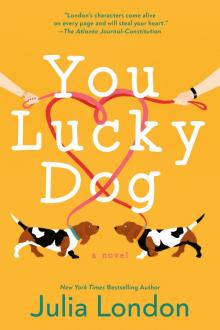 You Lucky Dog
You Lucky Dog The Devil in the Saddle
The Devil in the Saddle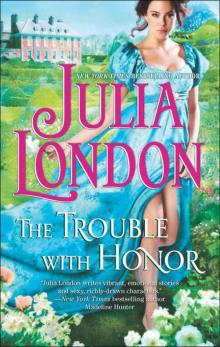 The Trouble with Honor
The Trouble with Honor Tempting the Laird
Tempting the Laird The Secret Lover
The Secret Lover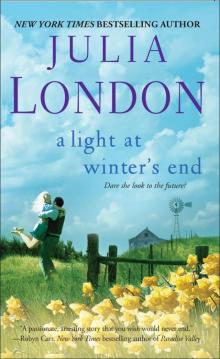 A Light at Winter’s End
A Light at Winter’s End The Charmer in Chaps
The Charmer in Chaps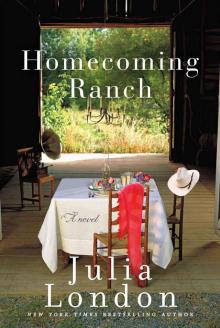 Homecoming Ranch
Homecoming Ranch Jack (7 Brides for 7 Soldiers Book 5)
Jack (7 Brides for 7 Soldiers Book 5)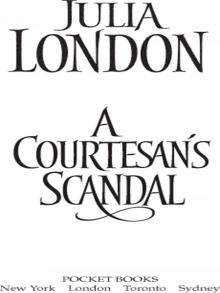 A Courtesan's Scandal
A Courtesan's Scandal Hard-Hearted Highlander--A Historical Romance Novel
Hard-Hearted Highlander--A Historical Romance Novel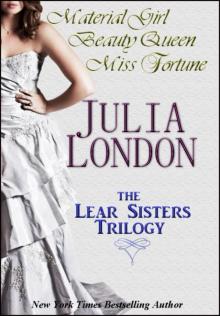 The Complete Novels of the Lear Sister Trilogy
The Complete Novels of the Lear Sister Trilogy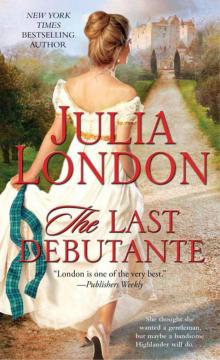 The Last Debutante
The Last Debutante Suddenly Single (A Lake Haven Novel Book 4)
Suddenly Single (A Lake Haven Novel Book 4) Seduced by a Scot
Seduced by a Scot Highlander Unbound
Highlander Unbound Suddenly Dating (A Lake Haven Novel Book 2)
Suddenly Dating (A Lake Haven Novel Book 2)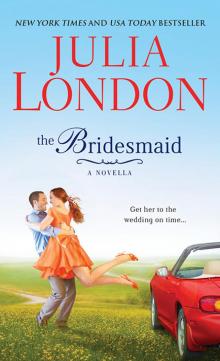 The Bridesmaid
The Bridesmaid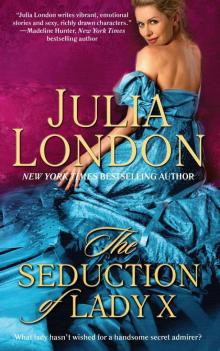 The Seduction of Lady X
The Seduction of Lady X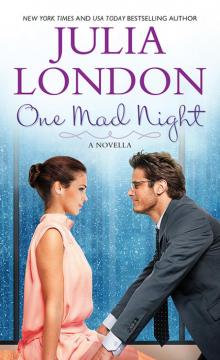 One Mad Night
One Mad Night Extreme Bachelor
Extreme Bachelor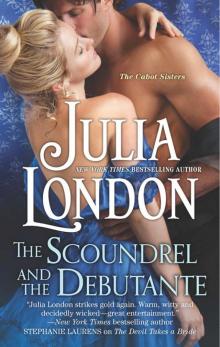 The Scoundrel and the Debutante
The Scoundrel and the Debutante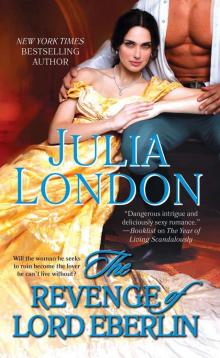 The Revenge of Lord Eberlin
The Revenge of Lord Eberlin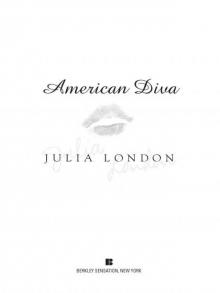 American Diva
American Diva The Lovers: A Ghost Story
The Lovers: A Ghost Story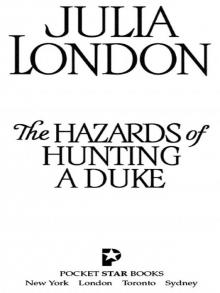 The Hazards of Hunting a Duke
The Hazards of Hunting a Duke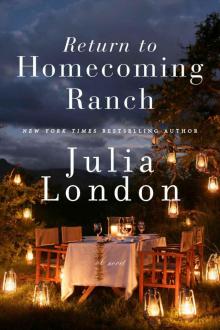 Return to Homecoming Ranch (Pine River)
Return to Homecoming Ranch (Pine River)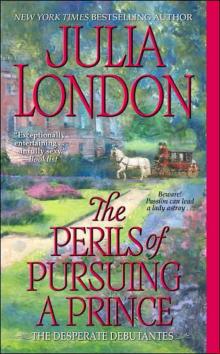 The Perils of Pursuing a Prince
The Perils of Pursuing a Prince Highlander in Love
Highlander in Love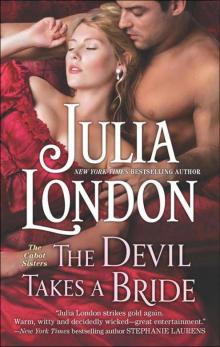 The Devil Takes a Bride
The Devil Takes a Bride Devil in Tartan
Devil in Tartan Wild Wicked Scot
Wild Wicked Scot Snowy Night with a Highlander
Snowy Night with a Highlander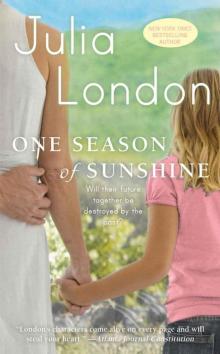 One Season of Sunshine
One Season of Sunshine Summer of Two Wishes
Summer of Two Wishes All I Need Is You aka Wedding Survivor
All I Need Is You aka Wedding Survivor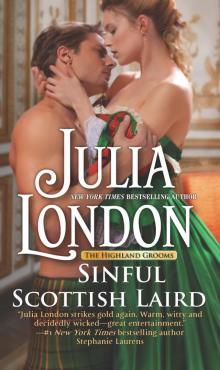 Sinful Scottish Laird--A Historical Romance Novel
Sinful Scottish Laird--A Historical Romance Novel Suddenly Engaged (A Lake Haven Novel Book 3)
Suddenly Engaged (A Lake Haven Novel Book 3)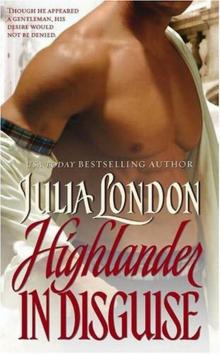 Highlander in Disguise
Highlander in Disguise Suddenly in Love (Lake Haven#1)
Suddenly in Love (Lake Haven#1)